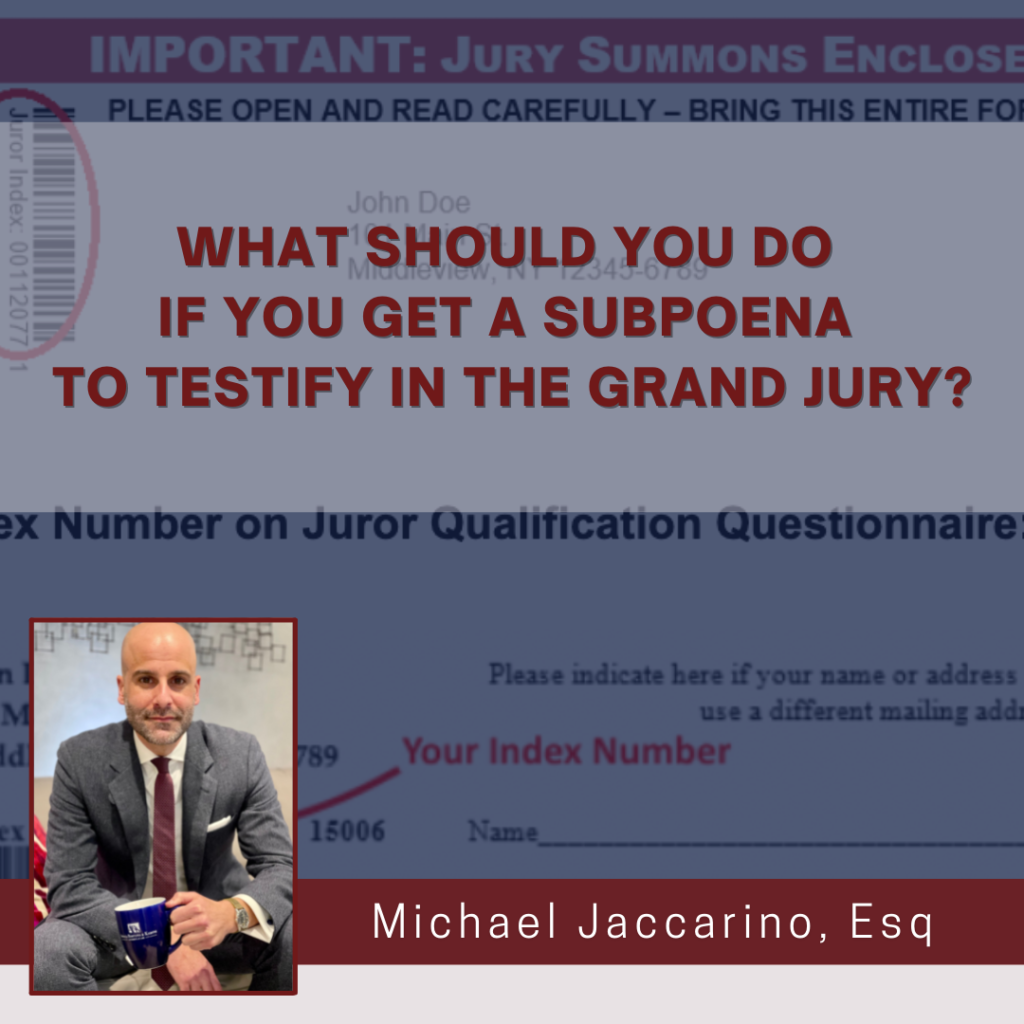ON BEHALF OF MICHAEL JACCARINO, ESQ. OF AIDALA, BERTUNA & KAMINS, PC POSTED IN BLOG ON MONDAY JUNE 13, 2022
What Should You Do If You Get a Subpoena to Testify in the Grand Jury? First, contact a lawyer at Aidala, Bertuna & Kamins. How can a lawyer from ABK help you?
What is a subpoena? A subpoena is a document backed by the power of the courts. A subpoena will generally require one of two things from you. Either the officers of the court are asking you to produce documents that they think may serve as probative evidence in their inquiry, or they’re asking you to come in person and answer questions, testifying about whatever matter they’re delving into.
You must answer a subpoena when you get it. You cannot simply ignore it. If you do, you can be held in contempt of court.
What does a grand jury subpoena mean?
It means that law enforcement believes you have evidence or could provide testimony that would help them in their criminal investigation.
Once you’ve been issued a subpoena, it’s important you comply. While your attorney can attempt to quash the subpoena, there must be valid legal reasons for doing so. If you are required to testify, you must be careful about what you say because you are testifying under oath. If you lie, you can be prosecuted. You may be able to invoke the Fifth Amendment and refuse to testify, but an attorney can help you determine if that’s appropriate in your unique situation.
Generally, A grand jury subpoena is used by prosecutors to obtain testimony or documents during the investigation of potential criminal conduct. Most commonly, subpoenas are issued in investigations of white-collar crimes such as frauds or corporate malfeasance, although they can be used to investigate any kind of crime. The first thing you should do if you receive a grand jury subpoena is to contact an experienced criminal defense attorney who can advise you properly about your options. You should do this even if you think you have nothing to worry about. Because grand jury investigations are secret, you cannot know why the subpoena was issued, and you may be at risk of incriminating yourself without even realizing it. Also, if you fail to comply with the subpoena, you may be sanctioned for contempt of the court.
If you receive a grand jury subpoena, you may not know what role prosecutors believe you to play in the investigation. In federal court, you may be a target or the investigation, subject, or merely a witness. In either scenario, an attorney can help you determine how prosecutors think you’re involved and whether you have criminal liability.
What is Grand Jury Immunity?
In order to encourage witnesses to testify before the Grand Jury, New York offers what’s called Grand Jury transactional immunity. Individuals who receive Grand Jury transactional immunity can never be prosecuted for any crime that is the subject of their Grand Jury testimony.
What Statute Governs Grand Jury Immunity?
New York’s Grand Jury Immunity is governed by CPL Section 190.40. Under that statute, all witnesses who testify before the Grand Jury are entitled to immunity.
Who is Entitled for Grand Jury Immunity?
Under CPL Section 190.40, a person who testifies before the Grand Jury and provides testimony that is responsive to the prosecutor’s questioning will receive what’s called transactional immunity. Transactional Immunity is immunity that prevents the witness from being prosecuted with regard to the inquiry of the Grand Jury so long as the testimony that they provide is responsive to the questioning of the prosecutor in the Grand Jury.
A Subpoena may also ask you to submit a wide variety of documents and information. A lawyer can help narrow the prosecutor’s request for documents and offer possible avenues for resisting production. Do not destroy documents or you could be charged with obstruction of justice, or worse. Check in later to read about subpoenas requesting specific documents or records.
Michael Jaccarino, and the criminal defense attorneys at Aidala, Bertuna & Kamins, PC, have decades of experience.
For more information or more fact-specific discussions, call our office and ask to speak with attorney Michael Jaccarino.



